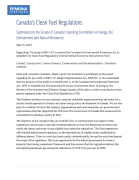In Connecting Canada on the Road to 2030 we conduct a preliminary examination of the role of internet use for teleworking in reducing greenhouse gas (GHG) emissions. This preliminary research aggregates data trends and averages from the U.S. where Canadian data was unavailable, and examines emissions from increased internet use and reduced transport. The research indicates that internet usage that supports teleworking can contribute to climate action:
- In the U.S., the reduction in transportation and commercial building emissions outweigh the increase in residential emissions for employees with short commutes in personal vehicles.
- Residential emissions from internet use are primarily attributed to the energy demand of access devices such as phones, laptops, and TVs, and the emissions intensity of the electricity grid that powers them. The emissions from the energy demand of data storage and transmission on the other hand are less elastic with usage.
- When workers telecommute part-time, net GHG reductions were only realized when office spaces were downsized and telecommuting opportunities were maximized wherever possible.
This analysis shows that there is a need for an in-depth analysis of the impact of teleworking in Canada using detailed Canada-specific data. The potential for reducing the carbon footprint of the ICT sector through options such as purchasing renewable power must also be examined, along with policies for supporting teleworking while maximizing GHG benefits.






